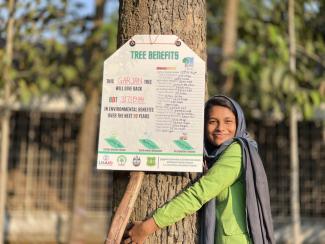Bangladesh is a hotspot for biodiversity, but its natural resources are under escalating pressure due to rapid population growth, urbanization, and climate change. With over 170 million people concentrated in a limited area, the demand for natural resources has led to deforestation, watershed degradation, and biodiversity loss. These losses in turn increase vulnerability to climate change, including rising sea levels and extreme weather events. Protection and proper management of forest resources are vital to improving resilience, reducing emissions, and increasing carbon capture. USAID works with the government and people of Bangladesh to address the impacts of climate change, ensure the burgeoning economy is climate-smart, and to safeguard wildlife, forests, and wetlands.
Strengthening Resilience to Climate Change
USAID strengthens the resilience of communities that are most vulnerable to climate change through increasing their access to climate information and alternative livelihood opportunities while preserving protected forests and enhancing tree coverage. In addition, USAID investments help local governments use climate information, data, and analysis to drive more effective decision-making and enable these institutions to better respond to the needs of local communities.
Protecting Biodiversity
Over the last 20 years, USAID has helped Bangladesh better protect its natural resources and biodiversity by bringing together local communities and the government to co-manage more than one million hectares – or nearly 2.5 million acres – of wetlands and forest areas. USAID also partners with local law enforcement agencies to combat transnational wildlife crimes in Bangladesh. Empowered community co-management groups monitor protected areas to conserve flora and fauna, prevent illegal poaching, and reduce natural resource degradation.
Promoting Sustainable Energy and Green Policy
Increased use of renewable energy, more energy-efficient technology, and diversifying the country's energy mix with sustainable and secure resources is critical to meet the increasing energy demand and maintain Bangladesh’s economic growth trajectory. USAID improves the financial viability of clean energy options and promotes incentives for investment. We also work closely with Bangladesh to develop more effective energy resource planning, subsidies and tariff structuring, energy procurement reform, and strengthen policies to underpin clean energy initiatives and reduce harmful emissions. These efforts aim to make sustainable energy more affordable and accessible to Bangladeshis in rural and urban areas, as well as commercial and industrial energy consumers.
Prioritizing Climate-Smart Agriculture
USAID-supported Feed the Future activities promote climate-smart agricultural approaches to help farmers and producers adapt to changes in growing conditions, and train farmers to adopt cultivation practices that reduce the intensity of greenhouse gas emissions. As weather becomes more volatile, USAID is helping reduce farmer exposure to climate risks through the use of machinery that speeds up the planting and harvest process. Investments in research for more resilient varieties of rice and other crops are enabling smallholder farm households to better endure shocks like drought, salt water intrusion, or increased prevalence of pests. Communities are also benefiting from new infrastructure specifically designed to withstand the increased rainfall intensity resulting from climate change.
Results
- Over the past decade, USAID has trained 250,000 people in the Chittagong Hill Tracts region to learn alternative livelihoods options to reduce their dependence on the area’s forests and natural resources, while helping them create forest management committees to help restore 4,000 hectares of forests and improving the governance of 67,000 hectares of additional forested areas.
- USAID programs in communities impacted by the Rohingya refugee crisis partnered with village groups to plant more than 220,000 indigenous saplings to restore biodiversity.
- USAID investments enabled more than 130,000 farmers to apply climate adaptation and mitigation technologies and practices, covering around 17,000 hectares of land and contributing to an increase in sales of agricultural products from $44 million in 2022 to $52 million in 2023.
Read the 2016 Bangladesh Tropical Forest and Biodiversity Assessment

